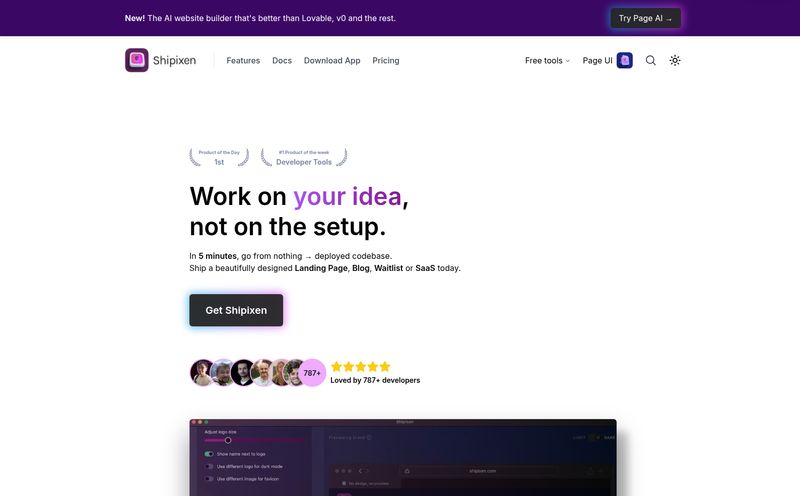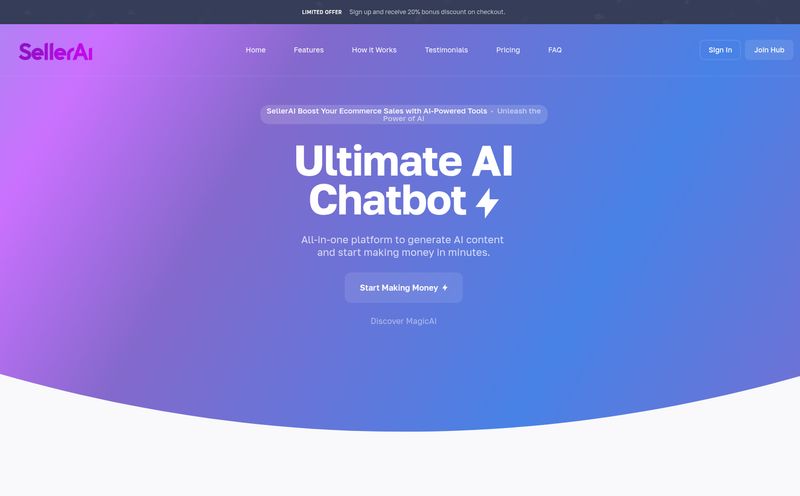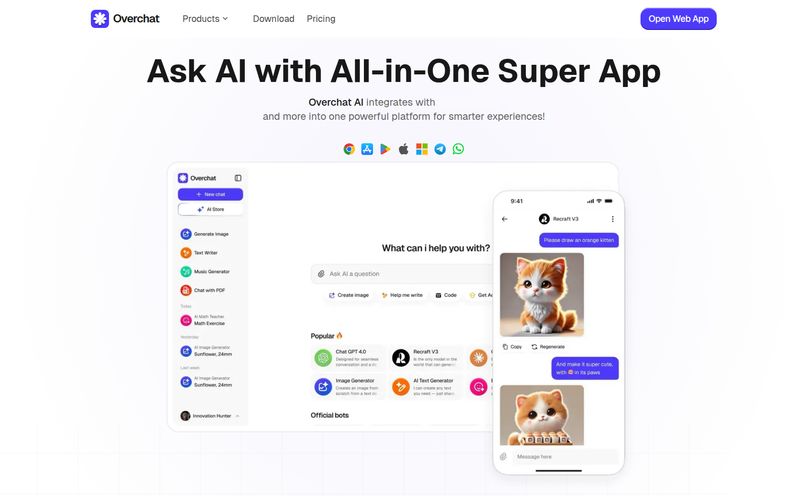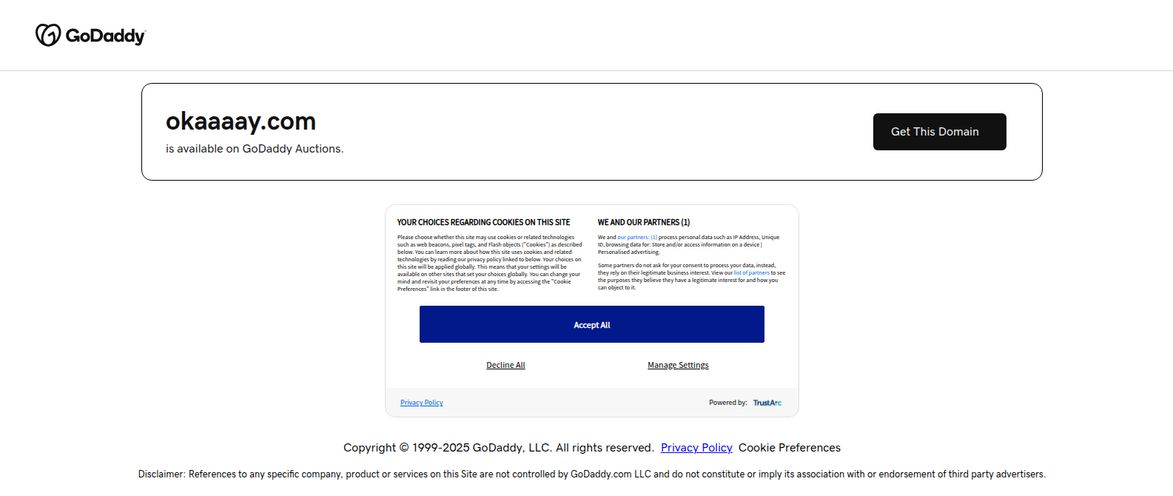It’s one of the first things we’re given, a label we carry for life. But a name is so much more than a tag, isn’t it? It's a story, a legacy, a vibration. I’ve spent years in the trenches of SEO and branding, and I can tell you that the right name for a product, a company, or even a blog can be the difference between hitting it big and fading into the digital noise. Get it wrong, and you might end up like the Chevy Nova, which famously struggled in Spanish-speaking markets because “no va” means “it doesn’t go.” Ouch.
So when a tool called Name Meaning popped up on my radar, claiming to explore names across different cultures using AI, my curiosity was definitely piqued. We’re living in a global village, after all. What sounds beautiful in English might be a clunker in Japanese. Could an AI tool really navigate these tricky cultural waters? I had to find out.
First Impressions: Navigating the Name Meaning Platform
Hopping onto the Name Meaning website, the first thing I noticed was its simplicity. Thank goodness. We’ve all seen those tools that look like the cockpit of a 747. This wasn't one of them. It’s clean, minimalist, and gets straight to the point. The main page presents you with a simple task: “Input Your Name.”
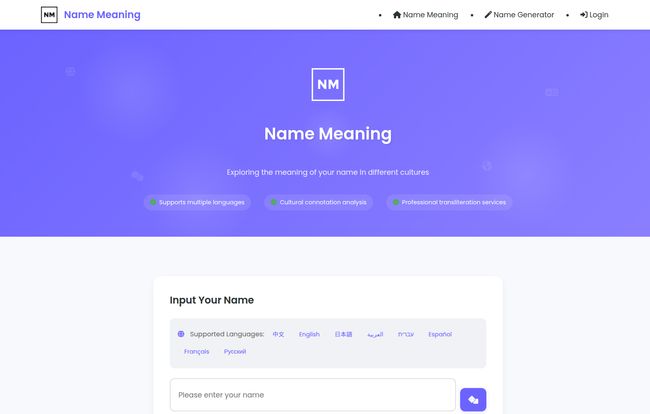
Visit Name Meaning
You type in a name, select the language you want it analyzed in (they currently support 8, including English, Spanish, Chinese, and Arabic), and you’re off. The whole process is laid out in a three-step guide: Enter Your Name, Choose Languages, Get Results. It’s the kind of straightforward design that shows the creators respect your time. No fluff, no fuss.
The Core Features That Actually Matter
Okay, a pretty interface is nice, but what can this thing actually do? I took a spin through its main functions, and a few things really stood out.
AI-Powered Name Generation for More Than Just Babies
Sure, the most obvious use case is for expecting parents agonizing over the perfect baby name. And for that, it’s great. The AI can generate suggestions that are not just unique but also come with a story. But my marketing brain immediately went elsewhere. What about naming a startup? A new software? A pet? The site confirms it’s for humans and pets, which I found charming.
The idea of using AI to brainstorm a brand name that works in multiple target markets is pretty compelling. It’s like having a multicultural creative team on call, without the massive agency fees.
Beyond Translation: Unpacking Cultural Context
This is where Name Meaning tries to separate itself from a simple Google Translate job. The platform claims to provide cultural context and connotation analysis. This is the holy grail for international branding. A direct translation tells you what a word means; a cultural analysis tells you how it feels. Does it sound strong? Poetic? Old-fashioned? Does it have an unfortunate association with, say, a farm animal?
For example, a name might translate to “light,” but in a specific culture, it might also connote intellectual brilliance or spiritual awakening. That's the kind of nuance that can make a name truly powerful. Getting this right is a huge advantage.
Professional Transliteration Services
The platform also offers transliteration. For those not in the weeds of localization, here’s a quick breakdown: Translation changes the meaning of a word from one language to another (e.g., “love” becomes “amor”). Transliteration changes the sound of a word into a different alphabet (e.g., the Russian “Горбачёв” becomes “Gorbachev”). This is super important if you want your brand name to be pronounceable for a global audience, even if they don't speak the original language. It ensures your brand’s phonetic identity stays intact.
The Good, The Bad, and The AI
No tool is perfect, right? After playing around with it, here’s my honest take on where Name Meaning shines and where it still has room to grow.
The Good Stuff
The user-friendliness is a massive plus. The data they show off—over 1,000 daily translations and more than 50,000 happy users—suggests people are finding it genuinely useful. The blend of translation, generation, and cultural analysis in one place is its real strength. It's an all-in-one naming workshop. It democratizes an aspect of branding that used to be incredibly difficult and expensive.
Where It Could Improve
Let's be real. The AI is a fantastic starting point, but I wouldn't bet the farm on it without a final human check. AI can process massive amounts of data, but it doesn't have lived experience. It can't tell you about that one obscure pop culture reference from 1982 that makes a certain name hilarious to anyone over 40 in Germany. For a major brand launch, you'd still want to run the final candidates by native speakers. Also, its limited to 8 languages right now. That covers a huge chunk of the world's population, but if your target market is in, say, Korea or Portugal, you're out of luck for now. Hopefully, they'll expand the roster soon.
So, How Much Does This Cost? The Pricing Puzzle
Naturally, my next question was about the price tag. I went looking for the pricing page to see what the damage would be, and... well, it's playing hide and seek. The pricing page link appears to be broken, returning a classic "404 Not Found" error.
So, what does this mean? For now, it seems the core features of the platform are free to use. This is amazing, but it also makes me wonder about their business model. It could be a freemium model where more advanced features are behind a paywall, or maybe they plan to introduce pricing later. My advice? Get in and use it while it's definitely free.
Who Is Name Meaning Actually For?
I see a few key groups getting a ton of value out of this:
- Expecting Parents: The obvious one. A great tool to find a name with a beautiful meaning that won't cause an awkward situation if your child ever travels.
- Writers and Creatives: Need to name a character from a different cultural background? This is a fantastic research tool to ensure authenticity.
- Pet Owners: Why should humans have all the fun? Find a noble, funny, or fitting name for your furry (or scaly) friend.
- Marketers and Brand Managers: This is my camp. Use it for initial brainstorming on product names, feature names, or even company names for an international audience. It’s a brilliant first-pass filter to avoid blunders like the Chevy Nova.
Final Thoughts From a Fellow SEO Geek
So, what's the verdict? I'm genuinely impressed. Name Meaning isn't a magic bullet that will solve all your naming problems with a single click. But it is an incredibly powerful and accessible tool that puts cultural and linguistic analysis at your fingertips. It’s like having a cultural compass for the world of words.
It lowers the barrier to entry for thoughtful, global-minded naming. While the AI’s suggestions should always be vetted by a human, it does the heavy lifting of research and brainstorming for you. For anyone—from a parent to a brand strategist—who believes a name is more than just a word, this tool is definitely worth a bookmark. And probably a few hours of fun going down the rabbit hole of what your own name means across the globe.
Frequently Asked Questions (FAQ)
- What is Name Meaning?
- Name Meaning is an online platform that uses AI to help you translate names, generate new name ideas for people and pets, and understand the cultural context and connotations of names in 8 different languages.
- Is Name Meaning free to use?
- Currently, the tool appears to be free to use. The pricing page on their website is not active, so you can access the main features without any cost for now.
- How many languages does Name Meaning support?
- As of now, the platform supports 8 major world languages: English, Chinese, Japanese, Arabic, Hebrew, Hindi, Spanish, and Russian.
- Can I use it to name my business?
- Absolutely. While it's marketed for personal and pet names, it's an excellent brainstorming tool for marketers and entrepreneurs looking to find a brand name that will resonate positively in different international markets.
- How accurate is the AI cultural analysis?
- The AI provides a very strong starting point based on data analysis. However, culture is deeply nuanced. For critical applications like a major brand launch, it's always recommended to verify the AI's suggestions with native speakers from the target culture.
